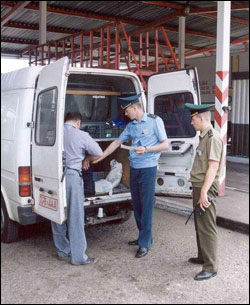Azerbaijan, Baku, Feb.24 / Trend , V. Javoronkova /
Many debates caused by distribution of customs duties among the participants of the Customs Union established between Russia, Belarus and Kazakhstan, are connected with the weakness of the project, experts say.
The mechanism of the distribution of customs fees must be approved before July 1, 2010.
Kazakhstan said that there is no "fair formula" in the distribution of customs duties in a union with Russia and Belarus, and it relies on a "political solution" of this problem, the Kazakh finance minister said this week.
Distribution of customs duties between the union members is one of the most difficult issues.
Russia, as the most capacious market, relied on a large part of the revenues; up to 90 percent of the collected import duties. Concerning export duties, Kazakhstan and Belarus have little part of them and Russia exports over 300 tariff lines on which export duties are levied.
"Most likely, the decision will be political, nevertheless, it will reflect those terms in foreign trade, which we had before joining the Customs Union and we do not have anything to lose," Bolat Jamishev said during his speech at the Kazakh Parliament.
According to experts, such discussions emerged deliberately.
"Project of the Customs Union is too precocious; it was taken in a raw form and quite rapidly. Its examination especially in 2009 was conducted rapidly," Kazakh expert Dosim Satpayev said.
The expert believes that many of the economic aspects of the Customs Union had not been considered.
"Only in late 2010, it will become clear if the Customs Union is viable or not," Risk Assessment Group Director Satpayev told Trend over the phone from Astana.
According to him, Russian, Kazakh and Belarusian governments needed to start with the creation of a certain integration association in the concrete field. For example, with agriculture, namely with more production of wheat; Russia, Kazakhstan and Belarus are among the most active suppliers of grain to the former Soviet Union, Satpayev believes.
According to him, a good example of such a union was the European Union.
"And we are talking about the creation of a single economic space in 2012, which is a higher level of integration. I believe that the authorities rush, which causes a large number of disagreements, imperfections and lack of answers to specific questions," Satpayev said.
German expert on Central Asia, Stefan Meister also believes that the problems is in the process of adopting decisions.
"The problem is that there is no general idea of how to develop a single economic zone. All three states do not want to give their money or rights in favor of two other," Meister told Trend via e-mail.
According to him, it is yet unknown under what conditions the sides will be able to achieve coordination.
Agreement on establishing a single customs territory and formation of the Customs Union, as well as an action plan for its establishment were adopted by the Russian, Kazakh and Belarusian presidents in October 2007.
The Customs Union is a single customs territory with single customs tariffs and without economic restrictions, except for special protective, anti-dumping measures.
A single customs tariff and commercial policy towards countries, which are outside the union, are envisaged.






